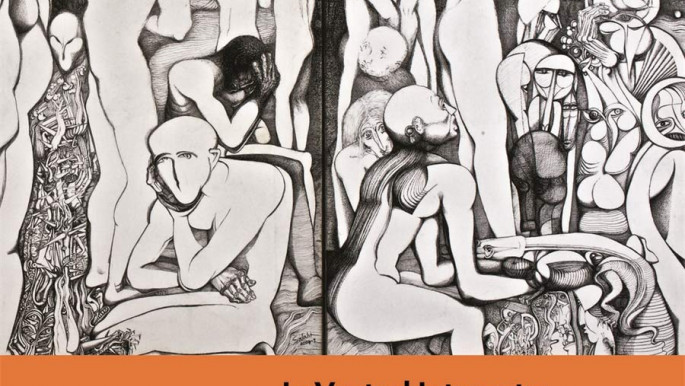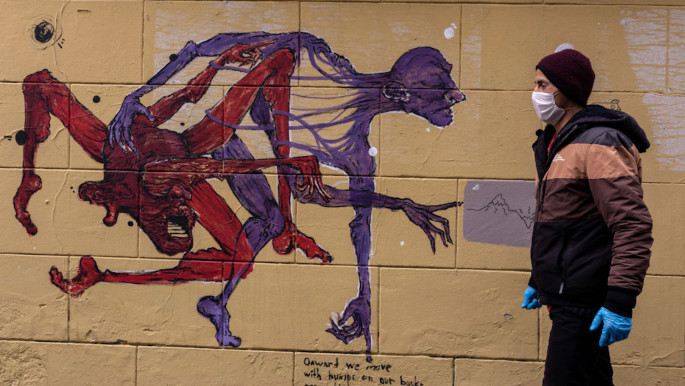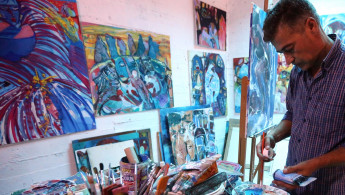In Vested Interests: A love of art that turned a Libyan businessman's passion into patronage
It conjures up feelings of warmth, safety, nurture and intrigue, within the tree there are flowers, but each flower appears unique for one another with different colours and patterns.
Each time I stare at the image I feel like I see something new. The description of the piece offered is the tree represents a connections to Attar's roots and homeland in Iraq, "Trees are deeply rooted in Attar's psyche, representing growth, endurance, beauty and also confinement, relevant to her personal exploration, especially as a woman: attempting to break free while also striving to remain attached to home."
Attar's masterpiece belongs to a private collection owned by the Libyan banker, AbdulMagid Breish, and is featured in his new book In Vested Interests: from Passion to Patronage The AbdulMagid Breish Collection of Arab Art with Louisa Macmillan and Mysa Kafil-Hussain as editors.
 |
|
In Vested Interests is more than a book cataloging someone's private art collection, its aim is to educate those who think they might be interested in contemporary Arab art, but do not know what is out there or how to explore it.
It is also aimed at those who might be interested in buying or investing in artworks from the region and includes important tips on how to understand the art market and considerations for investment.
Breish sees private collectors as essential for the survival of art from the MENA region, "When the state systems cannot be relied upon to support artists, private collectors can fill the void," he writes.
"I have come to believe that art and culture are among the essential facets of civilisation. Any country with a cultural tradition or heritage promotes a deep sense of spirituality through the arts... Over time, this will record the history of the country, and create a historical record of what happened to these artists, which is very important because it represents society in general."
 |
When the state systems cannot be relied upon to support artists, private collectors can fill the void |  |
The MENA region has faced issues that range from sanctions, repressive regimes to wars, all of which challenge the art and heritage of the region and there is a keen sense of urgency about both protecting and helping the arts thrive.
 |
| Read also: Why art in the Middle East matters more than ever |
In a modest way, Breish is trying to do these things and evangelise to bring others into the cause.
He is not merely an investor but has a deep passion and intimate knowledge of the arts.
In Vested Interests divides the artworks in Breish's collection into five main categories, the first three being investment types, and the last one being a focus on art coming out of Libya.
They include blue chip investments – which are pieces whose value remains consistent over time making profitable returns at auctions, large chip – whose value is high and goes up higher over time, medium cap – which consists of art by both living and dead artists who are well known, but not yet considered masters and whose value could go up and down.
Small cap makes up the last main investment type and these are speculative assets that are high risk as they come from unknown artists who could or could not be the next big thing.
Breish believes all such investments are important, especially the small cap ones, as it gives emerging voices from the region the chance to produce more works.
Going through the book it is clear that Breish has a good eye and each piece has something special about it.
As someone who is obsessed with meaning, I was struck by the layers of narrative embedded even in the simplest work. I couldn't help but feel there is a sense of direct or indirect tragedy throughout the collection, whether the tragedy was embedded in the artwork itself or by the simple fact it was appearing in this catalogue, as there is this keen awareness that the countries where they were produced cannot take care of them.
Read also: How coronavirus is pushing Middle East art online
Libya seems to exemplify this problem with war and militias meaning art is at risk and this is further hampered by the fact Libyan art rarely appears in international markets due to socio-political restrictions.
But as Mohammed Barudi's paintings show there is incredible talent in Libya. "With an expressive style evoking magic mysticism, Mohammed Barudi's work takes us on a journey to another world."
Taking on ordinary people as subjects, Barudi is two untitled works, putting them in transcendental light transforming our view of their everyday lives. It is the collision and intermingling of tradition and the modern, the spiritual and the profane, that is so alluring about his style.
In many ways this summaries Breish's collection, the experience of going through the catalogue blended different emotions and subjectivities together, but fundamentally there is something profoundly deep and attractive about it. In Vested Interests is in of itself a meeting place where ideas come together.
Usman Butt is multimedia television researcher, filmmaker and writer based in London. Usman read International Relations and Arabic Language at the University of Westminster and completed a Master of Arts in Palestine Studies at the University of Exeter.
Follow him on Twitter: @theUsmanButt


![President Pezeshkian has denounced Israel's attacks on Lebanon [Getty]](/sites/default/files/styles/image_684x385/public/2173482924.jpeg?h=a5f2f23a&itok=q3evVtko)



 Follow the Middle East's top stories in English at The New Arab on Google News
Follow the Middle East's top stories in English at The New Arab on Google News


